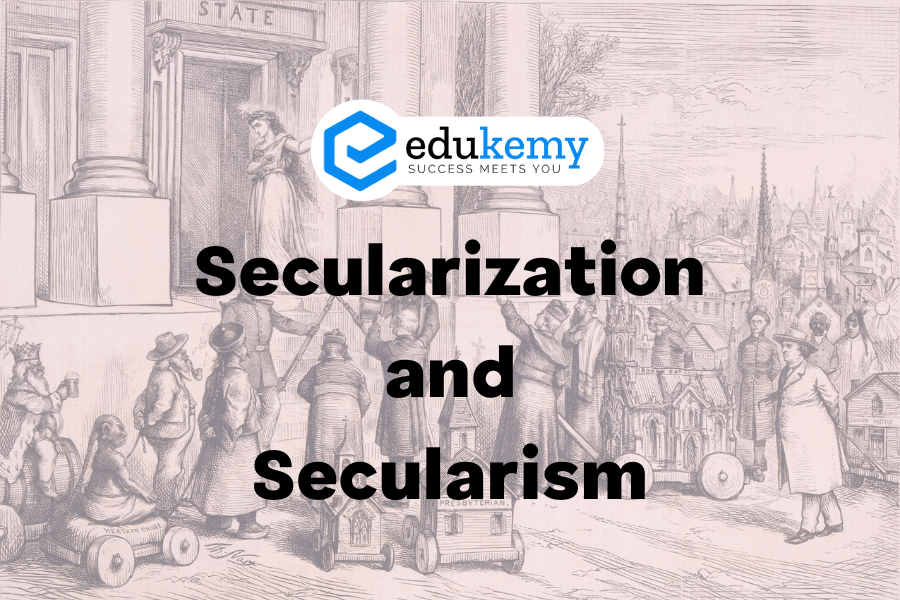
- The terms secularism and secularization are closely related. Secularism is a system or ideology based on the principle that there should be a sphere of knowledge, values, and action that is independent of religious authority, but it does not necessarily exclude religion from having any role in political and social affairs. Secularization, however, is a process which does lead to exclusion. Therefore, the two terms differ in advocating the role of religion in the society.
- During the process of secularization, institutions throughout society- economic, political, and social – are removed from the control of religion. Therefore, it leads to the separation of the state and religion. However, still, the former is not the same as the latter. While the separation of church and state is simply a description of what occurs in the political sphere, secularization is a process that occurs all across the society.
- In the separation of religion and state, political institutions i.e., those associated with varying levels of public government and administration, are removed from both direct and indirect religious control. While religious organizations can air their opinions about public and political issues, those views cannot be imposed upon the public, or be used as the sole basis for public policy. Therefore, while secularization is a state policy, secularism is largely a social process.
- Also, secularisation is not just the increase or decrease in visible markers of religiosity or in the attendance count of religious places, but also a fundamental shift in religious belief towards rationalization and objectification.
FAQs
Q: What is secularization?
Secularization refers to the process by which religious beliefs, practices, and institutions lose their social significance and influence in society, often replaced by secular values and institutions. This can include a decline in religious adherence, the separation of religion from governmental and social structures, and the rise of secular ideologies.
Q: What is secularism?
Secularism is a principle that advocates for the separation of religion from governmental affairs and public institutions. It promotes the idea that religious beliefs should not dictate government policies, laws, or public discourse. Secularism upholds the freedom of individuals to practice their religion (or not) without interference from the state.
Q: How does secularization impact society?
Secularization can lead to significant changes in societal norms, values, and institutions. It may result in increased individual autonomy and freedom of thought, as religious authorities lose their grip on social and political life. However, it can also contribute to moral and ethical dilemmas as society seeks new sources of meaning and guidance in the absence of traditional religious frameworks.
Q: Is secularization synonymous with atheism or agnosticism?
While secularization can coincide with an increase in atheism or agnosticism, they are not synonymous. Secularization primarily refers to the diminishing influence of religion in society, regardless of individuals’ personal beliefs. Atheism rejects the existence of gods, while agnosticism holds that the existence of gods is unknown or unknowable. Secularization encompasses a broader societal shift away from religious dominance.
Q: How do different cultures and regions experience secularization differently?
Secularization manifests differently across cultures and regions due to varying historical, cultural, and political contexts. In some Western societies, secularization has led to the separation of church and state, while religious influence remains strong in other parts of the world. Additionally, some societies experience secularization as a gradual decline in religious observance, while others may undergo sudden shifts due to political upheavals or cultural movements. Understanding these nuances is crucial for analyzing the impact of secularization globally.
In case you still have your doubts, contact us on 9811333901.
For UPSC Prelims Resources, Click here
For Daily Updates and Study Material:
Join our Telegram Channel – Edukemy for IAS
- 1. Learn through Videos – here
- 2. Be Exam Ready by Practicing Daily MCQs – here
- 3. Daily Newsletter – Get all your Current Affairs Covered – here
- 4. Mains Answer Writing Practice – here

